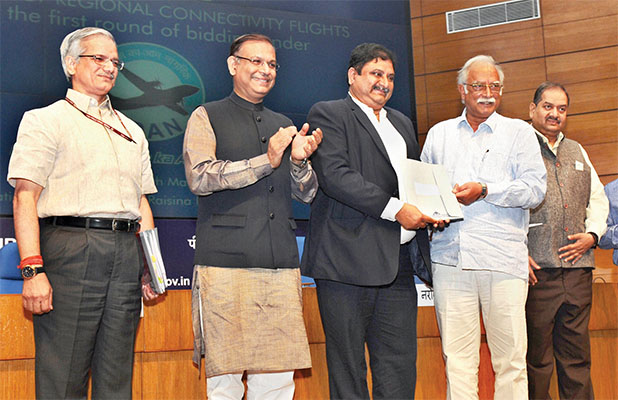RCS – UDAN
AIBM
April - June 2017

Union Minister for Civil Aviation, Ashok Gajapathi Raju awarded the Regional Connectivity Flight routes after first round of bidding under RCS-UDAN, at a press conference, in New Delhi on March 30, 2017 – Minister of State for Civil Aviation, Jayant Sinha; the Secretary, Ministry of Civil Aviation, R. N. Choubey; and Principal Director General (M&C), Press Information Bureau, A. P. Frank Noronha were also present
With the continued demand of regional connectivity at affordable prices in the Indian aviation industry, Ministry of Civil Aviation (MoCA) continue their action plan of ‘Ude Desh ka Aam Naagrik’ (UDAN).
Committed to providing air connectivity to currently underserved and unserved airports, the MoCA launched UDAN regional connectivity scheme in October 2016. As more citizens join the aviation network, the national aviation market, already one of the fastest growing markets in the world, is expected to welcome many first-to-fly customers. To make air travel accessible to citizens in the regionally important cities is the main mission of UDAN.
UDAN was developed through extensive consideration of various issues and consultations with stakeholders. This is a first-of-its-kind scheme globally to stimulate regional connectivity through a market-based mechanism. The diversity of these proposals indicate that a variety of business models may thrive in India’s aviation sector.
The airfare for a one hour journey of approximately 500 km on a fixed wing aircraft or for a 30 minute journey on a helicopter would be capped at INR 2,500, with proportionate pricing for routes of different stage lengths or flight duration. The selected airline operator would have to provide 50 pc of the flight capacity (subject to a minimum of nine and a maximum of 40) as Regional Connectivity Scheme (RCS) Seats for operations through fixed wing aircraft and a minimum of five and a maximum of 13 RCS Seats on the RCS Flights for operations through helicopters and would be given three years exclusivity of operations. On RCS route, the minimum frequency would be three and maximum of seven departures per week. To reduce the cost of operations of airlines on flying such routes, a financial stimulus in the form of concessions from Central and State government, airport operators and the Viability Gap Funding (VGF) to the interested airlines would be provided to kick-off operations from such airports, so that the passenger fares are kept affordable.
UDAN is a key component of the National Civil Aviation Policy (NCAP), which was released by the Ministry on June 15, 2016. AAI followed a transparent bidding process by inviting interested bidders and airline operators to submit their initial proposals under the provisions of RCS and subsequently inviting counter proposals against such Initial Proposals. This was followed by the opening and scrutiny of technical bids, and subsequently financial bids, for Initial Proposals as well as Counter Proposals. The routes and networks are awarded to bidders who submitted valid proposals and quoted the lowest VGF from the government for such routes and networks. Five airlines have won bids to operate on 128 routes that will be connecting 33 unserved and 12 underserved airports. Airline Allied Services Limited, SpiceJet Limited, Turbo Megha Airways Private Limited, Air Deccan and Air Odisha Aviation Private Limited are the five winning bidders. RCS-UDAN, which would be in operation for a period of 10 years, envisages providing connectivity through revival of existing air-strips and airports.
To ensure effective implementation of the Scheme and quick commencement of operations, MoCA and AAI, in parallel, are also undertaking a number of activities such as coordinating with various regulatory agencies like Directorate General of Civil Aviation (DGCA), Bureau of Civil Aviation Security of India (BCAS) and the State Governments, for various facilitating actions.










